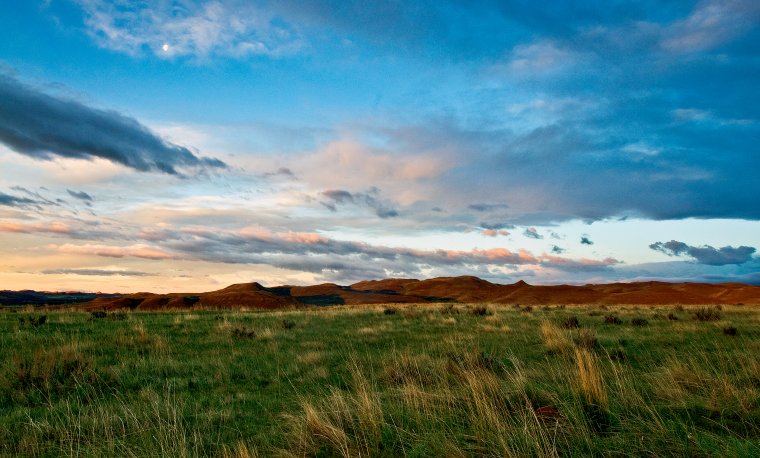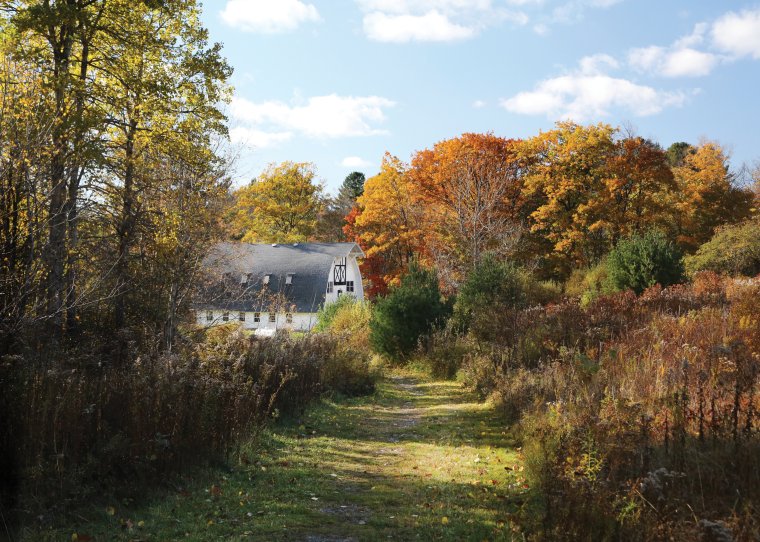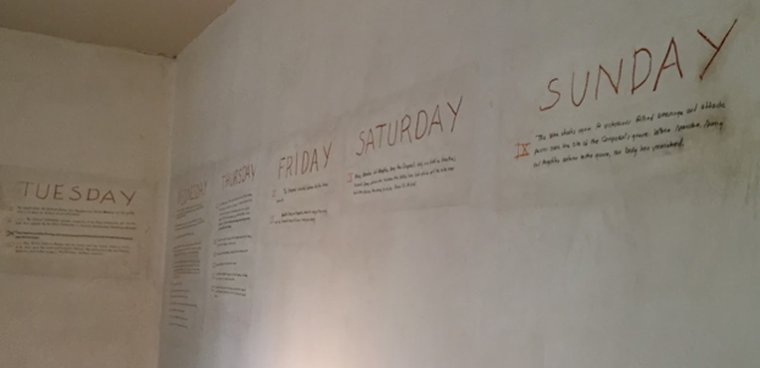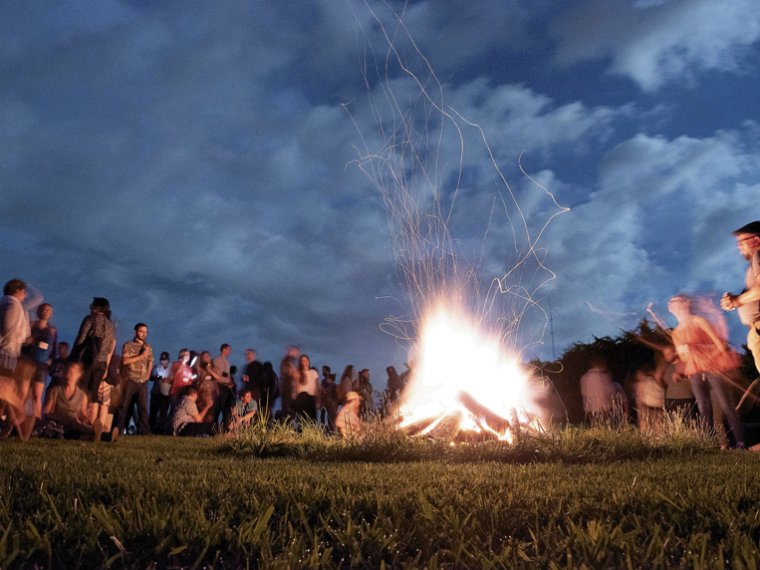Last spring I took a Friday off from work. The three-day weekend was required to cash in on a birthday present given to me by my partner: a stay-at-home writing retreat. For those three days, he would be my residency coordinator, cook, groundskeeper, and pet-care provider. Knowing I work best on a schedule, he created an hourly breakdown of my days, including writing time, meals, exercise, breaks, and an optional social hour. He offered a menu from which I could choose three meals a day, then prepared them for me. I had the option to eat alone in my “studio” (a small room that serves as an office in our one-bedroom apartment in Brooklyn, New York) or with my fellow residents (him, our dog, and our cat). He took care of the chores we normally tackle together on weekends—the laundry and cleaning, the errands and groceries—and left me alone. I recused myself from other creative projects and social commitments and readied my desk with my favorite essay collections, a cup of coffee and a glass of water, a notebook, and a laptop. I turned off my phone and Wi-Fi. Each day I woke up to an alarm, ate breakfast, wrote for a few hours, ate lunch, wrote for a few hours, took a break for a run and a stretch (or a beer and a snack) and wrote for a few hours more. Then I ate dinner and relaxed with a glass of bourbon and a book, or conversation about what I had worked on that day, and went to bed early. During my stay-at-home retreat I completed, revised, and submitted one essay, started another, and outlined a third. I accomplished in three days what might normally take weeks or even months.
This gift—of time, space, and ridiculously generous care—made me reconsider the ways in which we might carve out space for ourselves to write, even if only for a few days at a time. For writers with careers or kids, or both, who volunteer or take on creative projects or are involved in any number of life pursuits outside of work—in short, nearly all of us—it can be a difficult thing to do. A residency in some faraway cabin in the woods or retreat in the mountains can seem like an impossible dream: The challenges of taking time off work (which, even if it’s yours to take, can mean forgoing other trips) and navigating the many logistical hurdles required to leave home for any period of time can be enough to keep a writer from applying. And time aside, retreats can be expensive. Those that aren’t—the ones that cover lodging, food, and travel—are often highly competitive, accepting only a handful of writers each year. So what can we do? How do we make space for ourselves, either at home or away, for affordable, uninterrupted time to write? I spoke with several writers about how they took matters into their own hands and built a retreat for themselves—or, in some cases, with a little help from their family and friends.
***
“Once every winter, I go with two fellow fiction writers—Heidi Pitlor and Jane Roper—on a make-it-ourselves writers retreat. Sometimes we use spaces created for writers, like Wellspring House in western Massachusetts, and other times generous friends have gifted us use of their houses. As long as we each have a room with a desk, we’re good. We write during the day, then meet up in the evenings for food and wine. We take turns cooking for one another. Sometimes we read a bit of what we’re working on, but mostly we just relax. All of us have young kids at home and jobs and can’t go on longer residencies at this point, so flexible timing is key—one of us might come for three days, the others for five. Even a brief time away from our regular jobs and caretaking feels pretty radical, and freeing. It’s a simple setup, but the experience has a huge impact on our relationship with our work. It can be hard to leave.”
—Anna Solomon, author of the novels Leaving Lucy Pear (Viking, 2016) and The Little Bride (Penguin, 2011)
***
“The first year I applied to residency programs, I didn’t get into any (with full funding, anyway), so I asked a friend with a family lake house to let me use it for a week in the summer when it wasn’t being used by her family. I cooked a bunch of food, loaded up my car, and drove out there by myself for five days. It was a little creepy at night, but I got a ton of writing done.”
—Kit Frick, author of the young adult novel See All the Stars (Simon & Schuster, 2018)
***
“Last summer I wrote at home because I didn’t want to buy another plane ticket. I lived on the East Coast for more than a decade and had just moved to Chicago to start a new teaching job. After moving, then shuttling around for readings and a heavy teaching load, I wanted to spend the summer in the place that I had worked very hard to make my home. I wrote for several blogs, brainstormed projects, and wrote poems and essays. Although I didn’t go out often, I appreciated being close to a small circle of family and friends and sometimes invited other writers over as ‘day residents.’ For three to five days each week, I’d put on instrumental music, burn incense, make coffee, and write. At the end of the day, I’d make dinner. It was good to be able to sleep in my bed with my own pillows and drink coffee on my porch. The important part was staying on a schedule and setting deadlines.”
—Tara Betts, author of the poetry collections Break the Habit (Trio House Press, 2016) and Arc & Hue (Willow Books, 2009)
***
“I’m a big fan of artist colonies: I find that I not only get more work done at a residency than at home, but also that I go more deeply into my work. And yet in June of last year, I found myself in a weird spot: I’d decided to write a play, which would have made a fairly strange (and probably ineffective) application, considering I’m a fiction writer with very limited theater experience. So I rented a house in upstate New York with two of my best friends, authors Diana Spechler and Alison Espach. For a week, we wrote all day and laughed all night (we did not get a lot of sleep). Together we compiled this list of tips for anyone who might be planning a DIY residency: Go with people you truly like. Even just a long weekend can feel truly long if someone is getting on your nerves. And unrest is the antithesis of creativity. Ideally these people should also be dedicated writers who intend to work long hours. If you have any doubts, set up rules and boundaries in advance about work times, chat times, etc. Try to find a house where each person has her own bedroom, and where you have the choice between writing communally or separately. You’ll be spending a lot of time together, and a having a bit of privacy when needed can make a big difference. Get a house with a view. You’ll be inside working most of the time; if you’re overlooking a beautiful landscape, you’re less likely to feel cabin fever and more likely to feel inspired. Make a food plan ahead of time. We got most of our groceries for the week on our first day so we wouldn’t have to interrupt the work flow later on, and we rotated jobs at dinner time: Every meal, one person made the main dish, another made the side, and the third washed the dishes. This can be flexible, of course, but generally speaking the less energy exerted on such matters, the more energy left for your writing.”
—Shelly Oria, author of the story collection New York 1, Tel Aviv 0 (FSG Originals, 2014)
***
“Last summer was the first time my children were old enough for me to get away to write for a week. It happened because a friend invited a group to her house on Cape Cod. We were comprised of nine writers, musicians, and visual artists. The house was by the ocean, but it could have been anywhere. Mornings and afternoons, we worked by ourselves. Evenings, we took turns cooking dinner. Nights, our host gathered us in the living room to check in and share a sample of what we had done that day. Everyone participated. Conversations ranged from the personal to the technical aspects of our processes. This led to us experimenting with new art forms. Writers offered prompts for everyone to try. Musical theater folks got everyone to write a group song. We read aloud, sang, and laughed. I don’t think that would have happened if we practiced the same creative art. It was astonishing to try something new. The surprise and thrill was buoying when we returned to our individual work the next day. It all started with one person bringing people together and giving them the space to create and connect.”
—Jimin Han, author of the novel A Small Revolution (Little A, May)
***
“This past fall I desperately needed a concentrated chunk of time to work on my next novel. There was no way I could leave my family for the two-week-minimum stay at most traditional artist colonies, but two days I could swing. I enlisted friends to pick my kids up from school for a couple of days so I could steal some time for my work.
On a Thursday morning, after getting the kids to school, I took a two-hour bus ride from Portland, Oregon, where we live, to Astoria, a small town where the Columbia River meets the Pacific. It’s a tourist town, but I went in the off-season when the rains had already started, so I was able to get an affordable rate at a hostel for a private room with a shared bathroom for two nights. I brought snacks with me (apples, almonds, candied ginger: stuff that was easy to bring in my bag), went out for two meals and a coffee each day, and a walk by the river each morning, and otherwise hunkered down in the hostel room with my novel. I wrote, I watched the rain through the window, I wrote some more. I ate when I was hungry. I stayed up really late writing. I woke up when I wanted to. I didn’t have to take care of anyone but myself. I got a ton of writing done. That Saturday afternoon, my husband and kids joined me in Astoria for a short family vacation. I resented a bit that my sanctuary had been invaded by grubby little hobbits, but those two days of dedicated work time were so much better than nothing.”
—Cari Luna, author of the novel The Revolution of Every Day (Tin House Books, 2013)
***
“Last year, a group of friends from my MFA program got together for a weekend-long writers retreat. We rented an Airbnb in the Catskills for three days, driving up from New York City, Nashville, and Chapel Hill, North Carolina. We scheduled two workshopping blocks for whoever needed it—a couple of writers sent around pages, a couple more of us talked through ideas. Beyond that, we each used the time as we needed. One writer holed up in her room, churning out a first draft. A few of us wrote at the kitchen table. I introduced the idea of morning pages, à la Julia Cameron’s The Artist’s Way, and a few others joined in. It was as special for the writing and workshopping as for the reminder that we were a little community of writers, that we shared these friends and common goals and identity, whether we spend our days writing, teaching, or working office jobs. It was really helpful to have the accountability to other people to help make the weekend happen and put some structure into it. But it was also important to balance that out with individual goals—writing a first draft, transcribing interviews, annotating a nearly finished book proposal. We shared a broad goal and had our own individual priorities. That flexibility—and generosity—was crucial.”
—Jaime Green, writer and managing editor of Google Play Books
***
“I have several regular groups of writer friends who put together DIY gatherings—usually for either a week or more or a long weekend. The important thing is a cone of silence and knowing what type of retreat it is. Are you planning to do a lot of writing, then relax in evenings? Or are you planning to workshop? Make sure there is a food plan. And a wine plan. Also, it’s important to befriend writers who are good at planning and booking properties (and if you are this kind of person, you will be highly sought after; let’s be friends).”
—Gwenda Bond, author of the Lois Lane young adult novel series, including Triple Threat (Switch Press, May)
***
“During graduate school, I worked as a seasonal ranger in a series of state parks, partly to escape Houston’s mind-bending heat and partly to immerse myself in new environments. I led hikes, kayak floats, and campfire talks all summer. In the process, I learned a lot about the ecosystems of my parks, from the southern Appalachians to Oregon’s High Desert. Those seasons were full of unexpected treasures: Once a man gave me a cantaloupe because he had to give something away every day to be happy. Once I made chili with moose meat from my next-door neighbors, retired “full-timers” with an RV. One night, hiking back from town, I heard the rasp of bark beetles gnawing through a stand of pines. And more than once I had to dress up like a giant beaver. When the season ended, I’d drive back to Houston with my notebook full of overheard conversations, field guide excerpts, camping permits, and stories. Some of that material ended up shaping my first book; but maybe more important, those summers gave me a naturalist’s relationship to place. Even now, coming across a tree whose name and habits I learned back then—hemlock, alder, table mountain pine—I feel a jolt of joy like seeing a friend.”
—Joni Tevis, author of the essay collections The World Is on Fire: Scrap, Treasure, and Songs of Apocalypse (Milkweed Editions, 2015) and The Wet Collection: A Field Guide to Iridescence and Memory (Milkweed Editions, 2007)
More DIY Ideas
Do a housing swap
Swap houses or apartments with a friend or family member for a weekend (or longer, if you can manage). It doesn’t have to be a cabin in the woods; sometimes simply a new environment can be enough to get the gears turning.
Get a room
Whether it’s a Motel 6 a few miles away or a beachside resort in November, hotel rooms and bed-and-breakfasts can be an affordable short-term escape, especially if you book in advance and during the off-season.
Go to the library
If your city or town has a public library, it can be a great place to camp out for long hours, over the course of a few days. Bars and cafés may also work but tend to get loud, require you to buy something, and often discourage laptop loitering.
Write outside
If you have a quiet park in your city or town, it might be a great space to write if the weather’s nice. If you live in the country, take a hike to your favorite secluded spot. Pack a picnic and make a day of it.
Go camping
If you have a car and like to camp, hit the road for a weekend, pack a tent, and stay at campsites (which typically charge a fee of only a few dollars) at night. Bring a notebook or laptop and write at each stop.
Ride the train
Book a daylong, round-trip train ticket for a destination several hours away. Write as you ride, then get off at the end of the line. Have lunch and take a stroll around town, then get back on the train and write your way home. (A bonus for those who like to drink and write: the bar car.)
Melissa Faliveno is the senior editor of Poets & Writers Magazine.






